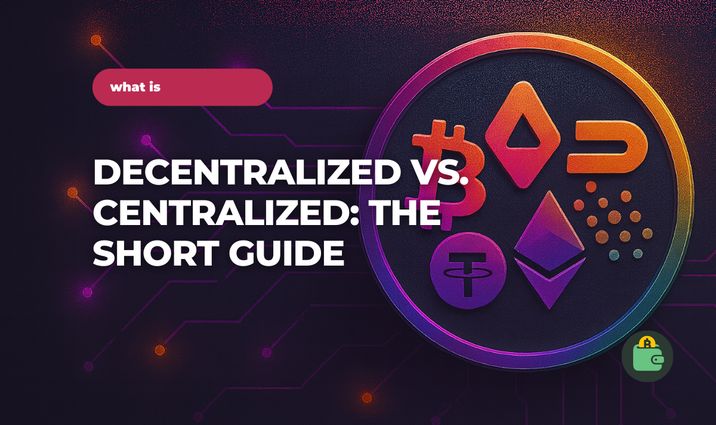Decentralized vs. Centralized Wallets: The Shift Toward Self-Custody

Beginner crypto users often confuse terms like DEX, CEX, decentralized and centralized wallets, and exchanges. No problem — the Coin Wallet team is here to help you sort it all out. Of course, we’ll also talk about how these services and platforms affect the safety of your assets.
What are Decentralized and Centralized Platforms?
There are many platforms and services in the crypto world, and the main differences come down to their transparency, how they store private keys, and how they are regulated by governments. But one key distinction is whether the platform is centralized or decentralized.
Centralized — or custodial — platforms (wallets, exchanges, etc.) are services managed by a third party (often a crypto exchange or online platform) that stores the user’s private keys and provides access to their funds. The user relies on the provider to safeguard their crypto assets. On a centralized platform, the user typically doesn’t control the private keys and can regain access through KYC procedures or a password reset. It’s similar to a bank account: your assets are held by someone else and subject to their rules.
For example, Coinbase Wallet (by Coinbase), Binance Wallet (or Binance Chain Wallet), Kraken Wallet, Gemini Wallet, and Bitstamp Wallet.
Centralized exchanges are commonly referred to as CEXs in the crypto community.
Decentralized or self-custodial (non-custodial) platforms are services where the user manages private keys and assets themselves, without the involvement of an intermediary. The user has full sovereignty: only the key owner can sign transactions and control their assets. If the keys or seed phrase are lost, access to the funds cannot be recovered.
For example, Coin Wallet, MetaMask, Trust Wallet, MyEtherWallet, Ledger Nano S/X, Trezor, and others.
Decentralized exchanges are called DEXs.
Pros and Cons of Decentralized and Centralized Platforms
Pros of Centralized Platforms
✅ Simple interface, often with exchange/fiat integration, high liquidity, and fast transactions
✅ Access via provider support (document submission, password reset, KYC recovery)
✅ Enhanced security measures (encryption, two-factor authentication, insurance coverage for funds)
✅ Integration with exchanges and DeFi services (e.g., staking, rewards programs)
Cons of Centralized Platforms
❌ Tax authorities and other financial regulators may request information about your accounts, and the platform will be obliged to provide it
❌ The user doesn’t own the private keys — a third party holds them and manages the funds, which goes against the principle of self-custody
❌ If the provider (exchange) is hacked, goes bankrupt, or freezes withdrawals (as happened with Mt. Gox, FTX, etc.), users may permanently lose access to their funds
❌ Mandatory KYC verification and data collection
Pros of Decentralized Platforms
✅ Only the user controls private keys and assets — the wallet cannot be frozen without their involvement
✅ KYC is usually not required
✅ No central “piggy bank” for hackers — keys are distributed across users
✅ Transactions are confirmed directly on the blockchain by the user, without waiting for approval from an intermediary
✅ Easy access to smart contracts, DApps, staking, and other decentralized services
✅ Hardware wallets are also decentralized and store keys completely offline
Cons of Decentralized Platforms
❌ If the user loses their private key or seed phrase, there is no way to recover access to the funds. A famous case involves a programmer who forgot the passphrase to a wallet holding 7,000 BTC and lost access permanently. Chainalysis estimates that about 20% of all Bitcoins are irretrievably lost due to forgotten seed phrases
❌ Requires more knowledge to manage private keys, understand fees, connect to networks, etc. — which can be difficult for beginners
❌ With hardware wallets, physical access to the device is required (e.g., Ledger); if the device is unavailable, urgent transfers may not be possible
How Do Centralized and Decentralized Services Affect Your Money?
Since centralized providers store large amounts of funds, they are attractive targets for cybercriminals. The histories of Mt. Gox, Coincheck, FTX, and others show that complete control by a third party carries a significant risk of losing users' assets. Additionally, in cases of service shutdowns or strict regulations (e.g., account blocking), users may temporarily or permanently lose access to their funds.
With decentralized platforms, if a user improperly stores a seed phrase or enters it on a compromised device, they risk losing their funds entirely. Phishing attacks pose the greatest threat: attackers often impersonate wallet support teams to trick users into revealing their seed phrase or password. Vulnerabilities in software or browser extensions (e.g., malicious plugins, keyloggers) can also be used to intercept private keys.
Each user chooses a wallet type based on personal priorities — convenience and integrated services versus full control and privacy. Regardless of your choice, it is critical to follow basic security practices: create secure backups, enable two-factor authentication, use hardware wallets when possible, and stay alert to phishing attempts.